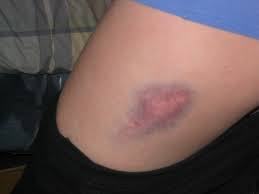记忆方法
1. break, breaks => debris => bruise.
2. debris => bruise, burst.
3. 谐音“不露伤”。
2. debris => bruise, burst.
3. 谐音“不露伤”。
中文词源
bruise 青肿
词源同break, 击,打,破碎。
英语词源
- bruise
-
bruise: [OE] Modern English bruise is a blend of words from two sources. The main contributor is Old English brysan, which as well as ‘bruise’ meant ‘crush to pieces’, and is related to Latin frustum ‘piece broken or cut off’. But then in the early Middle English period we begin to see the influence of the unrelated Old French verb bruisier ‘break’ and its Anglo-Norman form bruser (which in modern French has become briser).
Their main effect has been on the spelling of the word, although the use of bruise for ‘break’ from the 14th to the 17th century seems to have been due to French influence too, rather than a survival of the Old English meaning: ‘Had his foot once slipped … he would have been bruised in pieces’, The most dangerous and memorable adventure of Richard Ferris 1590. Bruiser ‘large rough man’ originated in an 18th-century term for a prizefighter.
=> débris - bruise (v.)
- Old English brysan "to crush, bruise, pound," from Proto-Germanic *brusjan, from PIE root *bhreu- "to smash, cut, break up" (cognates: Old Irish bronnaim "I wrong, I hurt;" Breton brezel "war," Vulgar Latin brisare "to break"). Merged by 17c. with Anglo-French bruiser "to break, smash," from Old French bruisier "to break, shatter," perhaps from Gaulish *brus-, from the same PIE root. Related: Bruised; bruising.
- bruise (n.)
- 1540s, from bruise (v.).
权威例句
- 1. Be sure to store them carefully as they bruise easily.
- 小心存放,因为它们很容易被碰伤。
- 2. How did you get that bruise on your cheek?
- 你脸上的淤伤是怎么搞的?
- 3. The bruise on his stomach ached with a steady throb.
- 他腹部的擦伤一直阵阵作痛。
- 4. Don't drop apples, they bruise easily.
- 苹果易碰伤,要小心轻放.
- 5. The rupture of a blood vessel usually cause the mark of a bruise.
- 血管的突然破裂往往会造成外伤的痕迹.

